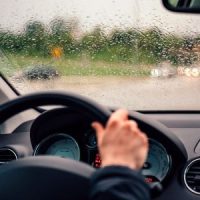Adjusting Your Driving During Bad Weather

Florida, while primarily known for its year-round balmy weather still sees its fair share of tropical storms and unpredictable weather, especially during this time of year. Unfortunately, these kinds of weather conditions can turn driving into an even more hazardous activity. This is why it’s so important for motorists to take extra care when driving during bad weather and to continue to educate themselves on how to safely operate a vehicle in the rain or fog.
Lower Your Speed
While it may seem obvious, slowing down is one of the best things that drivers can do to avoid being the cause of an accident in bad weather. Doing so gives drivers better control of their vehicles, allowing for more time to brake or swerve to avoid a collision. It also ensures that in the event of a collision, the damage to the vehicle and potential physical injuries are less severe.
Maintain a Safe Following Distance
It’s never safe to tailgate while driving, but doing so is especially dangerous in bad weather when fog or rain could make it harder to see a car in front of you in time to avoid a collision. Be sure to leave at least three seconds between yourselves and other vehicles, so that you’ll have enough time to avoid a crash.
Using Wipers and Headlights
Visibility is one of the first things to be affected by bad weather. Whether it’s fog, rain, or darkness caused by storm clouds, driving in these kinds of conditions make it a lot more likely that a collision will occur. To cut down on this risk, drivers should be sure to use their windshield wipers and headlights whenever they need to enhance visibility and alert other drivers of their presence. Of course, these tools are only helpful if they are properly maintained. A burned out headlight or worn wipers, for instance, may actually endanger you more than they help you. It’s also important to use the correct lights. Fog lights, for instance, are often preferable to high beams, which can actually scatter the light and make it harder to see.
Prepare for Slippery Road Surfaces
Slowing down, keeping a safe following distance, and using wipers and headlights can only do so much to help protect you while driving in bad weather. Rain and ice will undoubtedly create slippery roads, so drivers will need to avoid making sudden movements, like sharp turns or abrupt braking. Instead, try to make gradual adjustments to direction and speed, both of which can help you avoid skidding out of control and ensure that you can more easily avoid a collision.
Reach Out to Our Florida Auto Accident Lawyers Today
Bad weather doesn’t void a person’s responsibility to drive safe, so if you were injured in an accident because of someone else’s negligence, be sure to reach out to our experienced Fort Lauderdale auto accident lawyers to learn more about your legal options. At Boone & Davis, our dedicated attorneys and support staff have been helping Florida accident victims for more than 40 years. Let us put that experience to work in your own case by calling our office at 954-566-9919 today.
Sources:
nhtsa.gov/road-safety/driving-in-severe-weather
sanjoseca.gov/Home/Components/News/News/5536/4699
